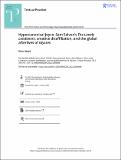Hypercanonical Joyce : Sam Selvon’s The Lonely Londoners, creative disaffiliation, and the global afterlives of Ulysses
Abstract
Roughly two-thirds of the way through Sam Selvon’s The Lonely Londoners (1956), there is a section highly redolent of the ‘Penelope’ episode of James Joyce’s Ulysses (1922). Commonly referred to as ‘Summer’, the section’s similarity to ‘Penelope’ has not gone unnoticed among either Joyce or Selvon scholars; to date, however, only J. Dillon Brown (2013) has offered a substantive reading of the connection. This article seizes on the relative absence of critical discussion of Selvon in Joyce studies to consider what might be the particular responsibilities that Joyce studies bears when reading Joyce’s global afterlives. Drawing on critical debates around the concept of global modernism, I discuss the terms of Joyce’s canonisation and his use in ‘diffusionist’ models of literary history. Building on Kandice Chuh’s (2019) analysis of the combined effects of liberal representational politics and hypercanonicity in literary studies, I contend that future studies of Joyce’s global reception and influence should seek to establish mutually transformative intercultural dialogue, which in turn requires opening the field to unsettling Joyce’s position in literary studies – and, to that end, I propose that Selvon’s novel provides an exemplary model of engagement with Joyce through ‘creative disaffiliation’.
Citation
Ward , K 2021 , ' Hypercanonical Joyce : Sam Selvon’s The Lonely Londoners , creative disaffiliation, and the global afterlives of Ulysses ' , Textual Practice , vol. 36 , no. 2 , pp. 326-347 . https://doi.org/10.1080/0950236X.2022.2003088
Publication
Textual Practice
Status
Peer reviewed
ISSN
0950-236XType
Journal article
Collections
Items in the St Andrews Research Repository are protected by copyright, with all rights reserved, unless otherwise indicated.

